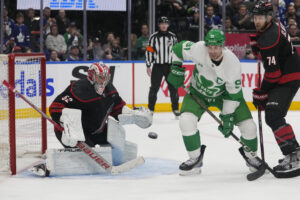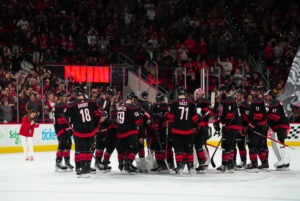Small trades with big results is a series that looks at trades throughout NHL history that seemed small or insignificant at the time but turned out to be much, much more. In this installment, we look at how Mark Messier ended up with the Edmonton Oilers.
Small NHL Trades with Big Results: Mark Messier
This trade has its roots in the World Hockey Association. The WHA was a rival league to the NHL that existed between 1972-1979. The WHA would challenge and essentially break the NHL reserve clause. The reserve clause was a clause in every player’s contract that automatically extended a player’s contract by one year when it expired, tying them to their team for the life of their career. The WHA was offering more player freedom and higher salaries. So while players would jump to the WHA looking for a bigger play day or a new challenge, their NHL rights were still held by their former team, if they ever wanted to go back. By 1979 the WHA was in trouble and about to fold. A deal was reached between the two leagues for there to be a merger.
The merger saw the Edmonton Oilers, Quebec Nordiques, Hartford Whalers and Winnipeg Jets join the NHL. Along with the merger, there was a player reclaim draft where NHL teams could select players that they held the rights to. One such player was Dave Semenko. Semenko was on the Edmonton Oilers but was reclaimed by the Minnesota North Stars during the reclaim draft. The Oilers wanted him back.
The Trade
On August 9th, 1979 Edmonton traded a 1979 2nd and 3rd round picks to Minnesota for Semenko and a 1979 3rd. Seems straightforward enough. While by today’s standards a 2nd rounder might seem high for a grinder like Semenko, it’s important to remember draft picks were not nearly as precious then as they are today. Still, it’s a few draft picks and a bottom-six player being exchanged. Nothing that would catch anyone’s attention.
North Stars
Neal Broten (2nd round pick)
Minnesota used its first pick acquired from the Oilers on Minnesota native, from the University of Minnesota, Neal Broten. Broten had a very strong rookie campaign with the Golden Gophers. He scored 21 goals and 71 points in 40 games. He was named the WCHA Rookie of the year. Broten also scored the clinching goal that won the Golden Gophers the 1979 NCAA Championship. Broten followed up his impressive rookie campaign by being named to the US National Olympic Hockey team for the 1980 Winter Olympics. He scored two goals and three points in seven games. The team would win an unlikely gold medal after upsetting the USSR in the final round-robin. In 1981 Broten would win the inaugural Hobey Baker award given to the top player in US College hockey.
Kevin Maxwell (3rd round pick)
The North Stars used the third-round pick from the Oilers to select Kevin Maxwell from the University of North Dakota. Maxwell has a strong season with North Dakota scoring 31 goals and 82 points in 42 games. Maxwell also played in the 1980 Olympics, representing Canada.
Oilers
Dave Semenko
Semenko was drafted by the North Stars and the Houston Aeros in the first round of the 1977 draft. Semenko chose to play for the Aeros of the WHA, while the North Stars retained his NHL rights. The Aeros traded Semenko to the Oilers prior to the 1977-78 season. Semenko played a physical and hard-hitting style. The Oilers used Semenko in an on-ice protector type role for their budding superstar Wayne Gretzky. When the WHA reclaim draft took place, the North Stars selected Semenko.
Mark Messier (2nd round pick)
Messier has an interesting pre-draft story. He was a standout for the Spruce Grove Mets of the AJHL as a 15-year-old (the league had an age limit of 20). After the 1977-98 season, he made the jump to the WHL and joining the Portland Winterhawks for their playoff run. He only played seven playoff games for Portland but posted four goals and seven points in those games. Messier was looking for alternatives to playing in the WHL and did not want to return to the AJHL.
It just so happened the Indianapolis Racers were looking for a new young player to replace some guy named Wayne Gretzky they had just traded. The Racers offered a full contract to Messier, for $30,000 no less. Messier decided to sign a five-game amateur tryout instead, which would allow him to return to junior if things didn’t work out. Messier made his debut for the Racers on November 8, 1978.
While he did play his five games with the Racers, he again refused a contract from the team. His refusal was a stroke of good fortune as the Racers folded in December of 1978. He then joined the Cincinnati Stingers for 47 games, notching 10 points. When the league folded in 1979, the Stingers were not one of the teams absorbed into the NHL. Players on the teams not being absorbed would be dispersed to the NHL teams that held their rights. The other option was to enter the NHL draft. Since Messier was still under the age of 20 at the time, he chose the draft.
The Aftermath
North Stars
Neal Broten was a good player for Minnesota. He played 16 total seasons for the Minnesota/Dallas franchise. He played in 992 games, scoring 274 goals and 867 points. While Broten was a solid NHL player, the North Stars were never able to win their ultimate prize, a Stanley Cup. They were close, making the finals in 1981 and 1991. Broten was traded to the New Jersey Devils in 1995. He was a key contributor in the Devils’ eventual Cup win that year. He posted seven goals and 19 points in 20 playoff games. Broten even scored the series-clinching goal for the Devils. He was a two-time All-Star and was inducted into the US Hockey Hall of Fame in 2000.
Kevin Maxwell never made much of an impact in the NHL. He played a total of 66 games over three seasons in the NHL. He registered six goals and 21 points. Maxwell has gone on to become a pro scout, currently working with the New York Rangers.
Oilers
Dave Semenko continued his role of protector to the Great One. He played eight seasons in Edmonton, winning two Stanley Cups with the Oilers. A legitimate hockey tough guy, Semenko recorded 70 fights and accumulated 1175 penalty minutes in his NHL career.
Mark Messier ended up being the real prize of this trade. He would develop into one of the greatest players in NHL history. In his 25 year NHL career, Messier played in 1756 games and scored 694 goals and 1887 points. His 1887 points are good for third all-time. He is one of only 90 players in league history to eclipse the 1000 point plateau. He is one of only 13 players to record at least 1000 assists in his career and is third in total assists. His 694 goals are ninth all-time. Messier is second all-time in games played.
Mark Messier was a key member of the Edmonton Oilers teams that won five Stanley Cups between 1984-1990. Messier won the 1984 Conn Smyth as playoff MVP. In total, Messier would win six Stanley Cups in his career. He holds the distinction of being the only player to captain two teams to a Stanley Cup. In 1990, he led the Oilers to their fifth Cup, while in 1994 he captained the New York Rangers to a Stanley Cup. He won two Hart Trophies as league MVP. He won two Ted Lindsay awards as the most valuable player as voted on by the NHLPA. Messier was a 15-time All-Star, include being named a first-team All-Star four times. in 2007, Messier was inducted into the Hockey Hall of Fame.
Big Things Can Have Small Beginnings
A trade that was for an enforcer-type player saw major returns for both teams, although one much more significant. Neal Broten was a very good NHL player. You would be hard-pressed to find a team that would trade him for Dave Semenko one-for-one. Still, Mark Messier was the real story in this deal. He is an NHL legend and an icon, especially in New York and Edmonton. All this out of a reclaim draft because of the WHA/NHL merger. Unfortunately for Minnesota (and fortunately for Edmonton), this is not the last time these two teams would strike a deal at the 1979 draft with its origins in the WHA reclaim daft.






